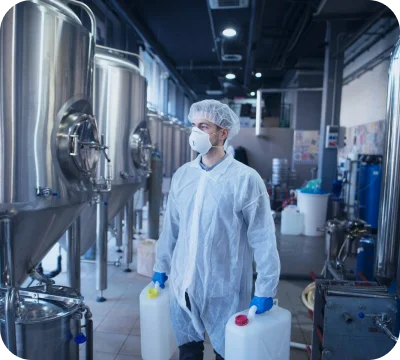The Chemistry of Sustainability: Low-VOC Formulations in Institutional Cleaning

How eco-designed chemistry is transforming hygiene from a necessity into a sustainability advantage.
Rethinking Clean: Where Chemistry Meets Responsibility
The future of institutional cleaning isn’t just about removing dirt-it’s about doing so without compromising the health of people or the planet. As facilities embrace sustainability, the chemistry inside cleaning bottles has become just as important as the results on surfaces.
Modern low-VOC formulations represent a fundamental shift: leveraging advanced science to deliver industrial-strength cleaning power while minimizing environmental impact and protecting indoor air quality.

Why Sustainable Cleaning Matters
Every drop used in kitchens, washrooms, or factories contains compounds that evaporate, react, and eventually enter our air and waterways. Among these are Volatile Organic Compounds (VOCs) chemicals that can contribute to poor indoor air quality and environmental pollution.
As India’s institutional cleaning sector expands across QSRs, hotels, and manufacturing plants, the need for low-VOC, non-toxic fiormulations isn’t just a CSR choice-it’s a business necessity.

Understanding VOCs in Cleaning Chemicals
What Are VOCs?
Why They Matter
- Air Quality: VOCs contribute to indoor air pollution and smog formation
- Health Risks: Prolonged exposure may cause headaches, eye irritation, or respiratory issues
- Environmental Impact: High VOC emissions affect ozone balance and aquatic ecosystems
In high-use environments like kitchens and hospitals, VOC exposure isn’t
occasional-it’s daily and cumulative. Staff members who handle cleaning
products multiple times per shift face the highest risk, making low-VOC
formulations a critical workplace safety measure.

The Science of Going Low-VOC
Water-based Systems
Green Surfactants
Zero-Ammonia & Chlorine-Free
Optimized pH Balance
Controlled Fragrance Load
The ESG Impact of Low-VOC Chemistry
Sustainability is no longer about intent-it’s about measurable outcomes. Switching to low-VOC formulations supports multiple ESG and SDG
goals:
Environment (E)
Social (S)
Governance (G)
The ESG Impact of Low-VOC Chemistry
Enhanced Comfort
Operational Efficiency
Certification Support
The Business Case for Sustainable Chemistry
Quantifiable CSR Metrics
Concrete data for annual sustainability reports and stakeholder communications
Simplified Audit Readiness
Streamlined compliance with HACCP, NABH, and ISO standards
Improved Customer Trust
Enhanced brand reputation through demonstrated environmental commitment
Operational Savings
Reduced costs through concentrated, efficient chemistry and lower product consumption

HNW's Commitment to Green Formulation

VOC Measurement
Laboratory VOC quantification using gas chromatography (GC) analysis
Environmental Testing
Biodegradability and aquatic toxicity assessment
Performance Benchmarking
Validation against global cleaning and safety standards
Planet-First Chemistry. Performance Engineered.
HNW Global Pvt. Ltd. creates intelligent hygiene and water-treatment solutions that combine scientific chemistry with sustainability. From the AI driven tool for hygiene visibility to the Smart Plant Program for water optimization, HNW enables organizations to achieve measurable operational and environmental impact.
Our mission is to transform facility management through innovation that serves both business objectives and planetary health. With decades of formulation expertise and a commitment to continuous improvement, we partner with leading institutions across India to deliver cleaning solutions that meet the highest standards of performance and sustainability.
Our Solutions
- Water treatment systems
- Hygiene monitoring programs
- Sustainability consulting
Industries Served
- Quick Service Restaurants
- Hospitality & Hotels
- Manufacturing Facilities
- Healthcare Institutions


